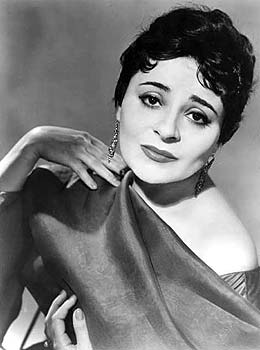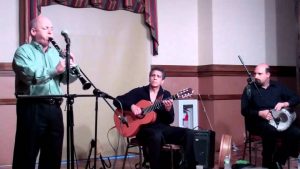
 Rivka Amado
Rivka Amado
Rivka Amado was born in Holon Israel, and spent most of her adult life in Jerusalem before moving to Berkeley, California in 2004. She traces her roots back to prominent Sephardic families—the Amado’s and the Barbut’s–on both sides of her family. After their expulsion from Spain both families eventually found their way to the Balkans where they remained for generations. Rivka’s parents made aliyah in 1933. She grew up In a Judeo Spanish-speaking home in Holon, where she learned traditional melodies from her grandmother, Rivka Amado-Mandil.. (Yes, Sephardim name their children after living relatives.)
For years Rivka sang Judeo Spanish songs and played the piano informally, and as well as sang in her synagogue choir in Jerusalem. Since moving to Berkeley, she has dedicated much of her time researching Sephardic culture and performing traditional Judeo Spanish music. With the aid of guitarist Joel Siegel, she has developed a program,
A Journey Back to Spain, in which she recounts the ways the Jews of Spain have been able to maintain their identity for five hundred years, long after their expulsion, first from Spain and then from the entire Iberian Peninsula. In this program she mixes historical narrative, accounts of Sephardic culture, and popular Judeo Spanish songs. Amado and Siegel have performed in many venues in the San Francisco Bay Area, and elsewhere. This program unites Rivka’s two halves; her musical half and her scholarly half. She earned her PhD from the University of Toronto in 1990, held post doctoral fellowships in medical ethics at the Hastings Center and at the Hebrew University, and has published widely in medical ethics and related fields.
She has also taught at Tel Aviv University, Bar Ilan University, Stanford, Berkeley and Princeton, and has received several awards for her scholarship and teaching. Rivka continues her scholarly and her musical work both in the United States and Israel.
In March 2009 she released her first album, Hija Mia, a collection of traditional Judeo Spanish songs, accompanied by master guitarist Joel Siegel and an ensemble of other talented musicians. She is planning a second album which will contain more traditional Judeo Spanish songs, as well as original compositions of her own in Judeo Spanish, Hebrew, and English.
Victoria de los Ángeles
 The famous Spanish soprano, Victoria de Los Angeles (real name: Gómez Cima), was born November 1, 1923 – Barcelona, Spain. She studied at the Barcelona Conservatory with Dolores Frau. In 1941 she made her operatic debut as Mimi in Barcelona, but then resumed her training.
The famous Spanish soprano, Victoria de Los Angeles (real name: Gómez Cima), was born November 1, 1923 – Barcelona, Spain. She studied at the Barcelona Conservatory with Dolores Frau. In 1941 she made her operatic debut as Mimi in Barcelona, but then resumed her training.
In 1945 Victoria de Los Angeles made her formal operatic debut as Mozart’s Countess in Barcelona. After winning 1stprize in the Geneva International Competition in 1947, she sang Salud in La Vida Breve with the BBC in London in 1948. In 1949 she made her first appearance at the Paris opera as Marguerite. In 1950 she sang at the Salzburg Festival for the first time. She made her debut at London’s Covent Garden as Mimi in 1950, and continued to appear there regularly with notable success until 1961. She also sang at Milan’s La Scala from 1950 to 1956. In October 1950 she made her first appearance in the USA in a Carnegie Hall recital in New York. She made her Metropolitan Opera debut in New York as Marguerite in March 1951, and remained on its roster until 1956. In 1957 she sang at the Vienna State Opera, and was again on the roster of the Metropolitan Opera from 1957 to 1961.
After making her debut at the Bayreuth Festival as Elisabeth in 1961, Victoria de Los Angeles devoted herself principally to a concert career. However, she continued to make occasional appearances in one of her favourite operatic roles, Carmen, during the next 2 decades. Her concert career continued as she entered her 7th decade, highlighted by a well-received recital appearance at New York Alice Tully Hall in March 1994. Among her other acclaimed operatic roles were Donna Anna, Rosina, Manon, Nedda, Desdemona, Cio-Cio-San, Violetta, and Mélisande. As a concert artist, she excelled particularly in Spanish and French songs. Victoria de Los Angeles died January 15, 2005 at Barcelona, Spain.
Yehoram Gaon
Yehoram Gaon; born December 28, 1939) is an Israeli singer, actor, director, producer, TV and radio host, and public figure. He has also written and edited books on Israeli culture.
The son of Sephardic Jewish parents—a Bosnian-Jewish father and Turkish-Jewish mother, both immigrants to Israel— he became an early inspiration of “solidarity and pride” for the Sephardic community.
Yoram Gaon was born in the Beit Hakerem neighborhood of Jerusalem in 1939. His father, Moshe-David Gaon, a well-known historian, was born in Sarajevo in 1889, and immigrated to British Mandate Palestine, where members of his family had lived for five generations. He was a school master and Hebrew teacher in Jerusalem, Buenos Aires, and İzmir. He was also a poet and a scholar of Ladino. In Turkey, he met and married Sara Hakim, returning with her to Jerusalem.
Gaon enlisted in the IDF in 1957. In the military, he joined the Nahal entertainment troupe, beginning a career in the performing arts.
After performing in the Nahal Brigade entertainment troupe during his army time, Gaon joined the “Yarkon Bridge Trio” (שלישיית גשר הירקון).
He was in the original singing group “HaTarnegolim” (“The Roosters”), founded in 1960 by Naomi Polani.
He became well known for his rendition of Naomi Shemer’s Od Lo Ahavti Dai (lit. I have not Loved Enough Yet). He performed at the Nobel Prize ceremony of Yitzhak Rabin, Shimon Peres and Yasser Arafat in Oslo, in 1994. In 2009, Gaon recorded the song “Shir Ha’avoda Vehamlacha” for the organization Pioneers For A Cure, with the proceeds benefiting The Israel Cancer Association (ICA).
Gaon appeared with the Israel Cameri Theatre in productions that included “Chips with Everything”, “Vitzek,” and “Kinneret Kinneret,” by the National Laureate, Nathan Alterman. He left Israel in the early 1960s to study acting at the famous Herbert Berghof Studio in New York, under well-known acting teacher Uta Hagen, later graduating with honors from the RCA Institute for TV Production.
He returned to Israel to play the starring role in the 1966 stage production of the original Israeli musical comedy Kazablan, which became an immediate hit, and ran for more than 600 performances. The musical’s huge success made this “young Jerusalem-born singer…not only…an overnight singing star, but also a figure of solidarity and pride for people of Sephardic origin, many of whom were entering a theatre for the first time.” Gaon later reprised his role in the 1974 film version.
Gaon moderated the Israel Broadcasting Authority documentary series for the Jubilee Year, entitled, T’kuma. In 1998 he resigned from the show, explaining in his letter of resignation that he believed that the series displayed “overly biased pro-Arab views.” “Gaon told the producers of the Channel 1 TV series that he could not tolerate one of the episodes, during which Arab terrorists, responsible for killing many Israelis in the 1970s, were seen to be glorified on the show.”
In 1993 he was elected to the Jerusalem Municipal Council, with the portfolio for Cultural Affairs and Special Education Needs, serving until 2002. He is the Honorary Consul of Chile in Israel. He also serves as the president of the Arkadash association of the Turkish immigrants in Israel. He also served as a Deputy Mayor of Jerusalem.
He is active in civic affairs, serving as a member of organizations that include the Committee for the Advancement of Ladino, Yad Ben-Zvi Fund for Diaspora Research, Adopt a Soldier Fund, The Association for Soldiers Welfare, The Association for Autistic Children, The Fund for Music Therapy and The Academy For the Hebrew Language. He is an advocate for peace who has spoken out on some issues, saying it is impossible to freeze growth in settlements, but on the other hand, “I do not approve of angering the entire world. We’re not living alone [on this planet], and we depend on other countries as well.”
Among Gaon’s many contributions to Israel’s cultural resources include the Moshe David Gaon Center for Ladino Studies at Ben Gurion University, which he and his brother Benny founded in memory of their father. In December 2010, he donated books to launch the “Sarah Hakim Gaon Library” for Arkadash, in memory of his mother.
He was cast as Yonatan Netanyahu in the Israeli film Mivtza Yonatan (English: Operation Thunderbolt) (1977). He also appeared in Siege, Every Bastard a King, The Eagles Attack at Dawn, Joker, The Lover, and No-Way Street. He starred in the autobiographical feature, Ani Yerushalmi (lit. I am a Jerusalemite) (1971).
He starred in several other TV series, including Krovim Krovim (1983), an Israeli sitcom. He hosted his own TV show called Shishi BeGaon (“Friday with Gaon”) on Israeli Channel One. The show was extremely popular, with a successful run for a number of years. He later hosted a weekend talk show on commercial Channel 2. Since 1997, he has been hosting a radio show on Reshet Bet called as “Gaon on the radio” (גאון ברדיו), in which he talks about the current weekly events and expresses his personal views on the various current weekly events.
“In The Middle Of The Road” is a book written by Gaon that includes poems, family stories and photos. He edited “Spices from Spain”, a collection of Ladino quotes (with Hebrew translations) passed down to him by his father, a well-known historian. He also published a second edition of “Eastern Jews in Israel,” an encyclopedic work originally published by his father. The complete work includes biographical information on almost 3000 rabbis, scholars and others in Spain, France, Italy, the Ottoman Empire including the Balkans, and the Middle East and North Africa who visited or immigrated to Israel, sometimes moving there to ensure they could die in the Holy Land.
Gaon has two children from his former marriage to Orna Goldfarb: Moshe-David (named after his father) and Hila. His three brothers are Yigal, Kalila Armon, and businessman and industrialist Benny Gaon, who died of cancer in 2008.
In 2004, Gaon was awarded the Israel Prize, for Hebrew song
The Elias Ladino Ensemble
The Elias Ladino Ensemble is one of the very few Sephardic groups whose vocalists are native speakers of Ladino. They are the real thing ,having been born and raised in that musical tradition.Their instrumentalists have mastered ” A la Turka” ensemble playing as well as World Class solo virtuosity . The group has performed together since their debut at the Smithsonian Institution’s ” Festival of American Folklife ” in 1976. Since then they have performed and collected material in every corner of the Ladino-speaking world, such as Istanbul, Izmir, Bat Yam, Safed , San Juan, Miami, Toronto, Barcelona, Zaragoza, and Folk Festivals , Universities, Hispanic Institutes, and congregations of many denominnations. In performance , they will explain each song and how it fits into the Ladino culture and where theses songs came from. Many of the songs can be traced back to 15th century Spain, while others from the Ottoman Empire. Turn back the clock to the early 20th Century to hear how this music sounded when our parents and grandparents first came to America.
 Yasmin Levy
Yasmin Levy
Levy is of Sephardic descent from the city of. Her late father, Yitzhak Isaac Levy (1919–1977), was a composer and hazzan (cantor), as well as a pioneer researcher into the long and rich history of the Judeo-Spanish music and culture of Spanish Jewry and its diaspora, being the editor of the Judeo-Spanish language magazine Aki Yerushalayim.
With her distinctive and emotive style, Levy has brought a new interpretation to the medieval Judeo-Spanish song by incorporating more “modern” sounds of Andalusian flamenco and Persian, as well as combining instruments like the darbuka, oud, violin, cello, and piano.
Her debut album was Romance & Yasmin in 2000, which earned her a nomination as “Best Newcomer” for the fRoots / BBC Radio 3 World Music Awards 2005, followed in 2005 with her second album La Juderia (Spanish: The Jewish Quarter). In 2006, she was nominated again, then in the category “Culture Crossing”.
On her second album, La Judería, she also covered the popular songs “Gracias a la Vida” by Violeta Parra and “Nací en Alamó” from the film Vengo, directed by Tony Gatlif, which in its original version won the 2001 César Award for Best Music Written for a Film (itself being a cover of “The Song of the Gypsies” (Greek: “Το Τραγούδι των Γύφτων”), written by Greek songwriter Dionysis Tsaknis in 1990).
Levy’s work earned her the Anna Lindh Euro-Mediterranean Foundation Award for promoting cross-cultural dialogue between musicians from three cultures. In her own words:
I am proud to combine the two cultures of Ladino and flamenco, while mixing in Middle Eastern influences. I am embarking on a 500-year-old musical journey, taking Ladino to Andalusia and mixing it with flamenco, the style that still bears the musical memories of the old Moorish and Jewish-Spanish world with the sound of the Arab world. In a way it is a ‘musical reconciliation’ of history.
Levy is a goodwill ambassador for the charity Children of Peace.

Isaac Salinas
Born in Havana Cuba, Isaac Salinas began his musical training at the Municipal Conservatory of Havana.and furthered his studies in music in Mexico City where he received a Master of Arts degree in Voice from the College of Music of The National Institute of Fine Arts (INBA), and a Doctorate in Voice (Opera) from The National Conservatory of Music of The National Institute of Fine Arts (INBA).
Blessed with a powerful tenor voice, Salinas became popular as a recitalist and an opera singer, not only performing classic opera but also classic Spanish Zarzuelas, Cuban boleros, traditional Mexican fare and even Sephardic music sung in Spanish and Hebrew, having been born to Jewish parents in Havana.
Not only is he well-known throughout Mexico, but he is also known in the United States, Latin America and Europe, and has performed in Brazil, Austria, Hungary, Rumania, Switzerland, Spain and Israel. On “The Sephardic Heritage,” Salinas is featured performing the classic Sephardic music of his ancestors.


